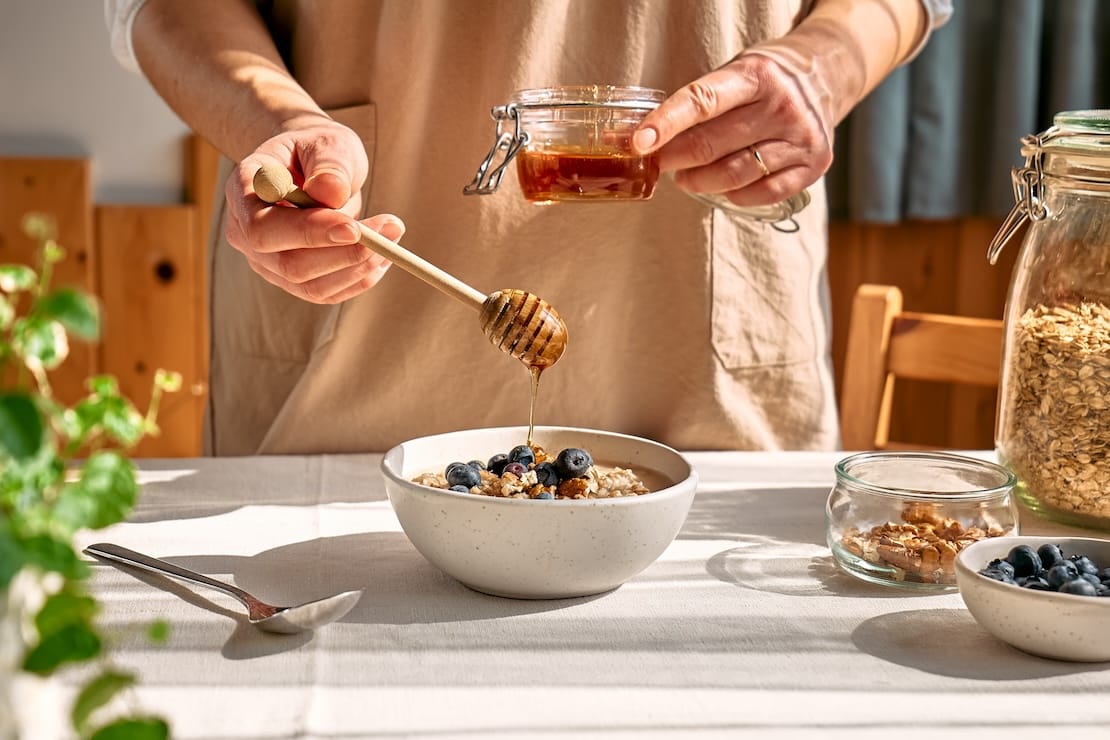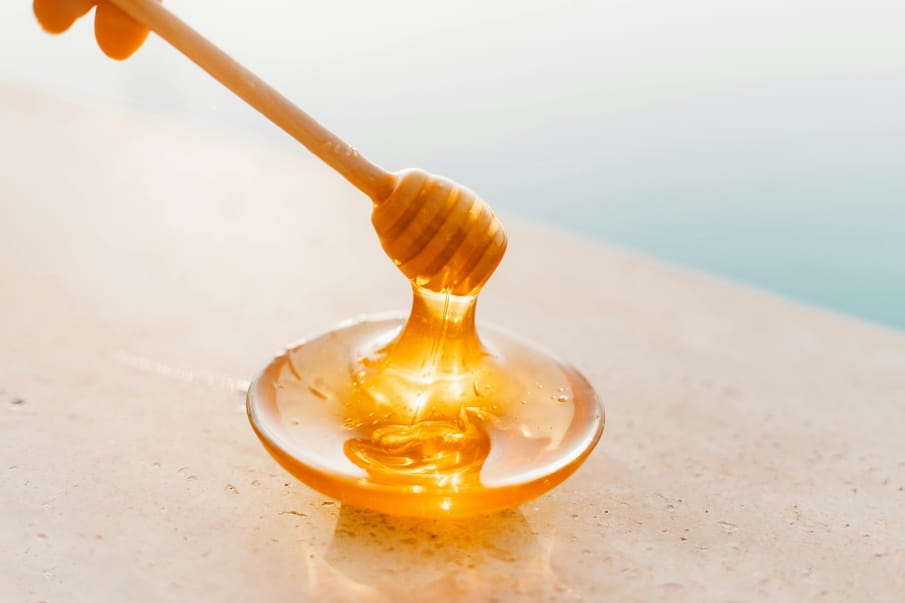Whether you’re stirring it into porridge, adding it to baking, or combining it with lemon to soothe a sore throat, honey is a popular cupboard staple. But are its benefits more than a dollop of sweetness?
With the global honey market valued at $8.94 billion in 2023, and only expected to grow, it’s clear that there’s a lot of buzz about this nectar. And while there’s no doubt it makes things taste that much sweeter, it turns out it could also come with some interesting health benefits, too.
“Honey has multiple health benefits, and, in essence, can be classed as a superfood since it has been used as a medicine both internally and topically since ancient times,” says nutritional therapist Sonal Jenkins.
From fighting off a cold to boosting your mood, there are certainly a lot of suggested wellbeing rewards – but which are proven and which are simply old wives’ tales? Let’s break it down to find out if honey lives up to the hype.
Benefits of honey: what’s the truth?
Fighting off colds and coughs
The next time you feel like a cold won’t shift, should you reach for the honey jar? While it’s not going to instantly cure the common cold overnight, it could certainly help – and there’s evidence to prove it.
“One of its health benefits is its antimicrobial properties, due to the hydrogen peroxide it contains, where it can help speed up the recovery from colds, flu, sore throats, and coughs,” explains Sonal.

One study of using honey in upper respiratory tract infections, published in BMJ Evidence-Based Medicine in 2021, found that it improved symptoms and reduced the severity of coughs, suggesting it could even be a potential alternative to antibiotics. However, that’s not to say that slathering your average supermarket honey on your morning toast will always be enough to do the job.
“Not all honey is the same,” Sonal says. “The antibacterial quality of honey depends on the type of honey, as well as when and how it’s harvested. Some kinds may be 100 times more potent than others, such as Manuka honey, from Australia and New Zealand.”
Healing properties of honey
“Manuka honey is also used for wound and burn healing,” explains Sonal, highlighting its reported skin benefits. According to Oxford Health NHS, medical honey can actually be used on wound dressings to stop bacteria growing in the bed of the wound, as well as reducing the inflammation of the wound, and removing dead tissue.
Medical honey might therefore be advised by the NHS for those who have experienced things such as burns, wounds, or ulcers. Research, including a study in Jundishapur Journal of Natural Pharmaceutical Products, has found that doing this improves wound healing, helps with pain relief, and even reduces inflammation.
Beyond these impressive healing properties, honey is also a popular ingredient in beauty products, with other benefits including that it’s thought to help with hair shine and breakages, as it contains roughly 0.5% protein.
Mood-boosting effects
Could honey actually make us happier? As well as giving us a sweet treat, it’s thought that honey could help boost our mood, as well as help our physical health. Maybe Winnie the Pooh was on to something after all!
“Honey is a type of sugar, and by providing a quick energy boost, it may release serotonin – a neurotransmitter that improves mood and happiness,” says Sonal. “There may also be anti-inflammatory effects that support health, both in the digestive tract and brain.”
Memory power
It’s thought that honey could also potentially support our memory and cognition, alongside our happiness. One study, published in Frontiers in Aging Neuroscience in 2022, saw that post-menopausal women who took honey for 16 weeks found an improvement in their short-term memory.
It’s worth noting that this doesn’t strictly apply to all types of honey though; Tualang honey (originating in Maylasia, but readily available to buy online) has been particularly well-studied in this area. It’s believed that this type of honey, in particular, can reduce our brain’s oxidative stress, improve the morphology of memory-related brain areas, and more, according to a study in Medical Sciences, all of which point to its role in helping with memory and learning.
Honey hacks: how to use honey in day-to-day life
Honey has so many potential uses to make the most of these benefits. First, let’s start with the obvious ones. Honey makes a great sugar substitute, so making the swap in everyday baking and dishes is a good idea.
“Honey is versatile; it can be used as a natural sweetener to add to beverages, and works well as a sugar substitute in most recipes. You may be already using honey in your porridge, and on top of pancakes, which is better than golden and maple syrup,” says Sonal. Not that we needed another excuse to enjoy pancakes!

It’s not just about having dessert for breakfast, you can use honey in other meals, too. However, it’s worth noting that it’s thought that heating honey could potentially reduce some of its nutritional benefits, so an alternative could be opting to blend it into a delicious salad dressing instead.
Don’t like the taste of honey, but still want the benefits? You might want to consider a daily Manuka honey supplement, such as Propolis and Manuka Honey Oral Spray (£9.99, Melora). Looking for skin benefits? For more serious wounds, medical honey is more appropriate, but for general skin health, you can even opt for trying honey beauty products, such as Hair Syrup’s Honey Dew (£24, Hair Syrup).
Honey not only tastes great, but is a natural remedy that has been praised and valued for thousands of years due to its health benefits – many of which are backed by real science. So, whether you want to soothe a cough, or just start your morning with a wellbeing boost, why not give honey a try to see what the buzz is about?


Comments